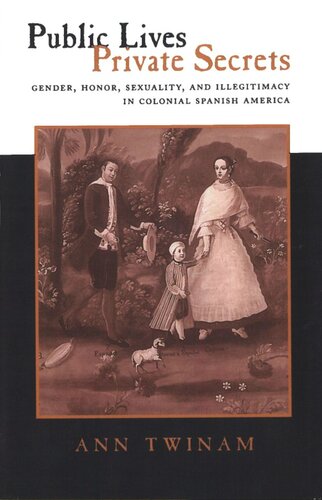

Most ebook files are in PDF format, so you can easily read them using various software such as Foxit Reader or directly on the Google Chrome browser.
Some ebook files are released by publishers in other formats such as .awz, .mobi, .epub, .fb2, etc. You may need to install specific software to read these formats on mobile/PC, such as Calibre.
Please read the tutorial at this link: https://ebookbell.com/faq
We offer FREE conversion to the popular formats you request; however, this may take some time. Therefore, right after payment, please email us, and we will try to provide the service as quickly as possible.
For some exceptional file formats or broken links (if any), please refrain from opening any disputes. Instead, email us first, and we will try to assist within a maximum of 6 hours.
EbookBell Team

5.0
60 reviewsThroughout the eighteenth and early nineteenth centuries, illegitimate offspring of elite families in colonial Spanish America appealed to the Council and Cámara of the Indies in Spain to purchase gracias al sacar legitimations. Their applications provided intimate testimony concerning their own lives, accounts of their parents' sexual relationships, and details regarding the impact of illegitimacy within their families and communities. Bourbon officials in Spain debated which petitions merited approval, and in the process forged policies concerning gender, sexuality, illegitimacy, and the family. Scattered throughout the Archive of the Indies, the petitions were difficult to locate until the author determined the pattern of how they were archived and was able to access this extraordinarily rich new source for Spanish American social history. For this book, she has not only analyzed the gracias al sacar documents of some 240 illegitimates, but also traced the histories of those involved in eighteen major archives in Spain, the Caribbean, Mexico, and South America. The collective biographies of the gracias al sacar parents, and of their illegitimate offspring—as infants, children, and adults—reveal a Hispanic mentality that consciously differentiated between the public and private spheres. Colonial elites distinguished between a private circle of family, kin, and intimate friends and a public world where status (honor) was negotiated with outside peers. This bifurcation was distinct yet permeable; an individual might "pass" to negotiate a public status different from a private reality. Thus, an unwed mother might enjoy the public reputation that she was a virgin, the bastard son of a priest might be treated as legitimate, and a mulatto could be transformed into someone white. The author explores how the probability for passing varied throughout the Spanish Empire, and how it narrowed as the eighteenth century drew to a close. She also demonstrates that the inability to conceptualize passing beyond the scope of the individual exacerbated social tensions prior to independence.